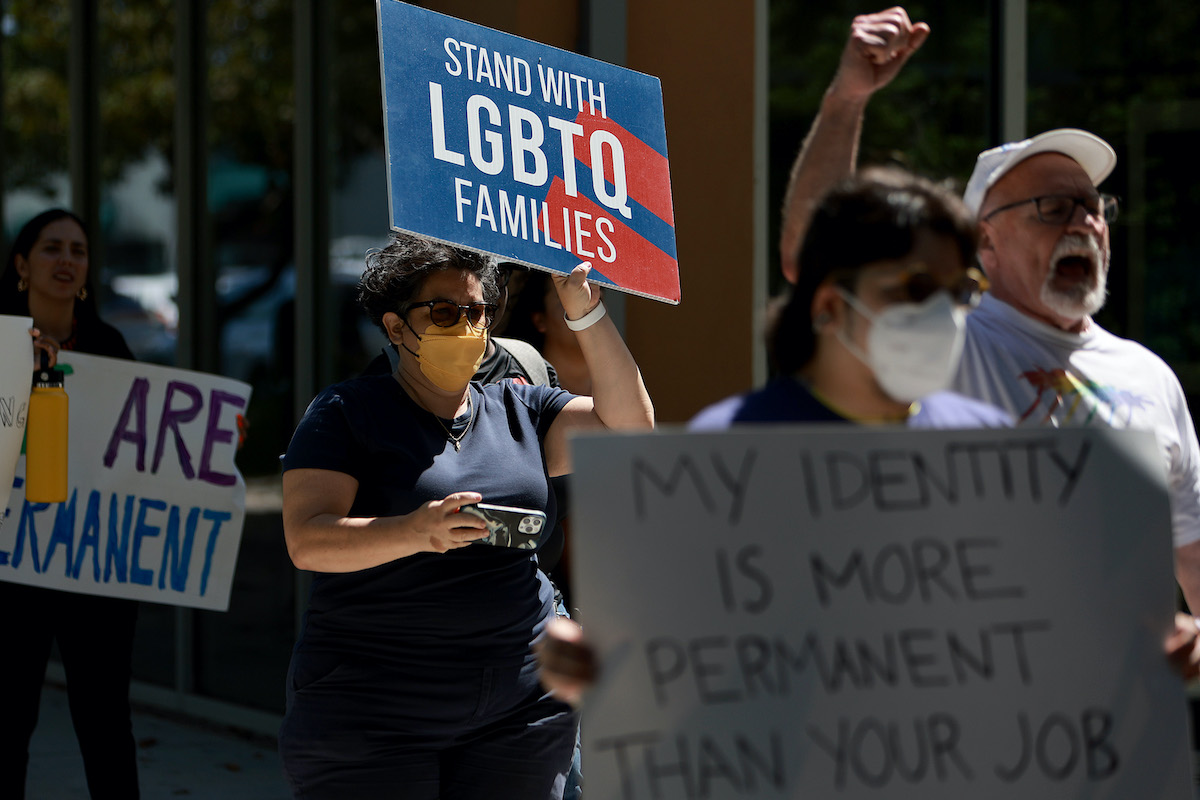Hateful Republicans Just Introduced a National ‘Don’t Say Gay/Trans’ Bill
"It would have an absolutely chilling effect on the entire country."

2022 has seen a record number of anti-trans bills introduced in state legislatures across the country. We’ve also seen broader attacks LGBTQ+ rights, from Florida’s “Don’t Say Gay” law to the Supreme Court’s decision to hear the case of a website designer eager to discriminate against clients in same-sex relationships. (Given the overwhelmingly conservative makeup of that court, I think we can guess how they’re likely to rule and let’s just say we’re not expecting a win for LGBTQIA communities.)
Now Mike Johnson, a U.S. Congressman from Louisiana, has introduced legislation that would take Republicans’ desire to force LGBTQ+ Americans into the closet beyond the state level. Johnson’s bill is essentially a federal “Don’t Say Gay/Trans” bill. It would pull federal funding from any program, government agency, private organization, or institution that exposes children under 10 to “sexually-oriented material.”
What exactly constitutes “sexually-oriented material”? By the Republican definition, that includes “any depiction, description, or simulation of sexual activity, any lewd or lascivious depiction or description of human genitals, or any topic involving gender identity, gender dysphoria, transgenderism, sexual orientation, or related subjects.”
Some of the big items Johnson and other Republicans have taken issue with include teaching any form of sex education in elementary schools (a necessary component of developmental education) and any events involving drag queens (a fun way to get kids interested in activities like reading while also providing a safe and supportive environment for self-expression).
But the bill’s insidious wording would also have similar effects to what we’ve seen in Florida, barring LGBTQIA educators from discussing their own identities to the point of not even being allowed to mention, for example, the existence of their partner if they are in a same-sex relationship. It pretty much guarantees most transgender people would be excluded from jobs in schools and any other profession that would put them in contact with or even make them visible to children. And by including “related subjects” in the list of prohibited topics (and by sexualizing the very existence of LGBTQ+ people), there’s no limit to what could be challenged.
The bill would also prohibit educators and other adults from acknowledging the identities of LGBTQIA students. Literally just acknowledging that a student is questioning their gender identity or sexual orientation is enough to get all federal funding pulled from their school or other program or institution and is also, according to the text of the bill, grounds for civil lawsuits.
This bill would be disastrous for teachers and schools but it also goes far beyond that. The wording of bill is so deliberately vague, it’s genuinely hard to think of an entity that wouldn’t be affected. Anything that receives any federal funding would be subject to these restrictions, and that includes everything from museums and community arts programs to the military to Amazon.
The wording here is so vague that it’s impossible to know where the lines are actually set—which is, of course, by design. As Alejandra Caraballo, a clinical instructor at Harvard Law School’s Cyberlaw Clinic, told me, typically “there would have to be a direct nexus between the federal funding and the actual thing” being restricted. Not so here.
This bill, Carabello notes, does not even define what it means to be “federally funded.” Does that mean that an entire university could lose funding for research grants, student loans, and everything else based on something that happens in one department? Does it mean Amazon could lose all federal subsidies because it sells books on trans issues—or even just novels with queer protagonists that a child playing their parent’s phone could potentially stumble across? Does this affect private companies and individuals with government contracts? Because just about every major company in the country has some sort of contract with the government.
What makes all of this even more nebulous is that point about civil lawsuits. By leaving a major portion of the bill’s enforcement up to private right of action, it casts a cloud of fear around the issue. This is exactly what we saw happen in Texas with the passage of SB 8, that turned private citizens into abortion bounty hunters. The fear of litigation is more than enough to make abortion providers—and now, in this case, schools, employers, and anyone else—err on the side of caution.
“It’s just so broad and so vague,” Caraballo says. “It would have an absolutely chilling effect on the entire country.”
It is telling that Republicans have chosen now as the time to introduce the bill. With Democrats controlling both chambers of Congress and the White House, there’s basically no chance of it progressing. It’s very clearly a fear-mongering ploy to get voters riled up ahead of the midterm elections next month.
That is not, however, a reason to not take this bill seriously. (Most Americans spent years not taking the GOP’s outlandish abortion bans seriously and look where we are now.) Republicans have a very good chance of taking back at least one congressional chamber and this gives us a look at what their priorities will be if that happens—and what the party is already prioritizing at the state and local levels.
“It’s literally—and I don’t say this lightly—Nazi-style fear-mongering around LGBTQ people,” Caraballo says. “It’s this kind of fascist linking of LGBTQ people’s identities with the sexualization of their identities and essentially declaring them as being unsafe to be around children.”
The only thing Republicans have to run on is a platform of fear and hate, so that’s exactly what they’re doing.
(image: Joe Raedle/Getty Images)
Have a tip we should know? tips@themarysue.com